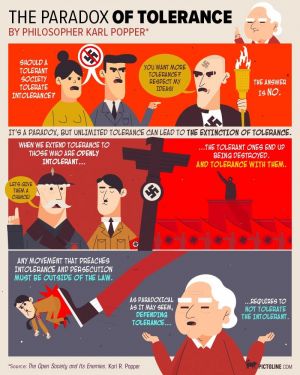Paradox of Tolerance: Difference between revisions
No edit summary |
mNo edit summary |
||
| Line 1: | Line 1: | ||
[[File:Paradox of tolerance.jpg|alt=Paradox of tolerance|thumb|Should a tolerant society tolerate intolerance?]] | [[File:Paradox of tolerance.jpg|alt=Paradox of tolerance|thumb|Should a tolerant society tolerate intolerance?]] | ||
'''Is a criminal simply someone who is mentally ill? Were they born with an enlarged part of the brain which gave them an overbearing propensity to break the law? | '''The paradox of tolerance is the idea that a society that is entirely tolerant of all things will also be tolerant of intolerance.''' The issue with this is if the society is tolerant without limit, its ability to be tolerant is eventually seized or destroyed by the intolerant. ''A thought experiment for this would be to think: Is a criminal simply someone who is mentally ill? Were they born with an enlarged part of the brain which gave them an overbearing propensity to break the law?'' | ||
It is paradoxical in the idea that in order to maintain a tolerant society, the society must retain the right to be intolerant of intolerance. A thought experiment, to show your extent of tolerance is looking at where you draw a line, what do you think of is a crime? | |||
In the Western European democracies, the speech of racists, Communists, Fascists, and Nazis has been successfully outlawed for this very reason. In the United States, by contrast, the first amendment right to freedom of speech has been interpreted to encompass extremist speech. The US is either overestimating the human capacity for rationality or underestimates the harms that speech can cause.<ref>Rosenfeld, M., & Bollinger, L. C. (1987). <nowiki>''</nowiki>'''Extremist Speech and the Paradox of Tolerance'''. Harvard Law Review, 100(6), 1457.<nowiki>''</nowiki> doi:10.2307/1341168 </ref> | In the Western European democracies, the speech of racists, Communists, Fascists, and Nazis has been successfully outlawed for this very reason. In the United States, by contrast, the first amendment right to freedom of speech has been interpreted to encompass extremist speech. The US is either overestimating the human capacity for rationality or underestimates the harms that speech can cause.<ref>Rosenfeld, M., & Bollinger, L. C. (1987). <nowiki>''</nowiki>'''Extremist Speech and the Paradox of Tolerance'''. Harvard Law Review, 100(6), 1457.<nowiki>''</nowiki> doi:10.2307/1341168 </ref> | ||
<hr> | <hr> | ||
'''References''' | '''References''' | ||
Revision as of 09:47, 4 October 2022
The paradox of tolerance is the idea that a society that is entirely tolerant of all things will also be tolerant of intolerance. The issue with this is if the society is tolerant without limit, its ability to be tolerant is eventually seized or destroyed by the intolerant. A thought experiment for this would be to think: Is a criminal simply someone who is mentally ill? Were they born with an enlarged part of the brain which gave them an overbearing propensity to break the law?
It is paradoxical in the idea that in order to maintain a tolerant society, the society must retain the right to be intolerant of intolerance. A thought experiment, to show your extent of tolerance is looking at where you draw a line, what do you think of is a crime?
In the Western European democracies, the speech of racists, Communists, Fascists, and Nazis has been successfully outlawed for this very reason. In the United States, by contrast, the first amendment right to freedom of speech has been interpreted to encompass extremist speech. The US is either overestimating the human capacity for rationality or underestimates the harms that speech can cause.[1]
References
- ↑ Rosenfeld, M., & Bollinger, L. C. (1987). ''Extremist Speech and the Paradox of Tolerance. Harvard Law Review, 100(6), 1457.'' doi:10.2307/1341168
